Keep Your Dogs Safe
Don’t Let Them Eat Foods They Shouldn’t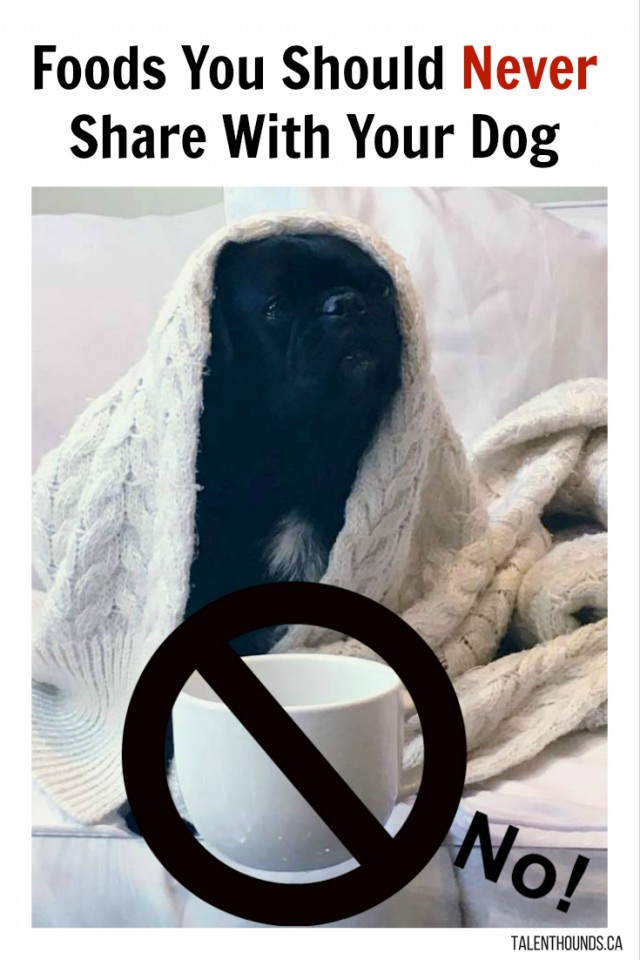
I confess – I am totally guilty of slipping Kilo the Pug little tastes at the table, especially on occasions like birthdays or Thanksgiving. We bond over our love of food much to my husband’s chagrin.
However, there are a few human foods you should never share with your dog.
It may be hard (or impossible in my case) to resist your dog’s big eyes peering up at you, but it is even harder watching the vet induce vomiting because they have eaten something toxic (chocolate in Kilo’s case).
Creating our new recipe series, Dog Licks -dog-friendly homemade treats, we wanted to make sure we use foods that are safe for dogs and remind everyone about those that are not.
Some of these dangerous foods may surprise you.
We compiled a list of common human foods that might harm your dog according to reputable sources like the ASPCA and Pets Web MD.
Dogs explore with their mouths and scavenge for food in the case of Kilo. People drop things or leave them in reach by mistake. Kilo has stolen chocolate, a raisin, onions, chips, nuts, cheese, chewing gum and sushi. Last night he stole 3 seeds from black olives and hid them in his crate. They look like kibble and he must have collected them one by one from the dish on the table or someone dropped them (we had guests). I hope he didn’t swallow any. I only found them as he climbed up, pawed his Christmas basket and stole a large pork skin roll still in a plastic wrapper that fell down. He snorted his way to his crate because it filled his mouth.
Keep your dog safe by making sure items in your kitchen are tucked away out of reach or not left out on the counter. Many baking products such as baking powder and baking soda may be toxic if eaten alone. So are spices like nutmeg. Keep pantry doors closed or locked to help protect your dog from serious food-related illness.
For further Dog Mom tips to keep your dog safe read here.
It’s a great idea to always keep the numbers of your local vet, the closest emergency clinic, and the ASPCA Animal Poison Control Center at (888) 426-4435 -handy and accessible in case of an emergency. If you think your dog has gotten into something toxic, call for emergency help right away.
We have had two major incidents with Kilo so far and I can highly recommend the ASPCA hotline. They have vets on call and stats for poisonings and treatments across north America. You pay a small fee but well worth it.
Human Foods That Can Be Toxic For Dogs
Alcohol
Beer, liquor, wine and foods containing alcohol should all be avoided. Alcohol has the same effect on a dog’s liver and brain that it has on humans and takes far less to do damage. And the smaller the dog, the greater the effect. Symptoms may include vomiting, diarrhea, central nervous system depression, problems with coordination, difficulty breathing, coma and death.
Avocado
There is some debate about the risks and benefits of small quantities of certain avocados from different areas. However many contain a substance called persin and it’s found in the leaves, seed, and bark, as well as in the fruit. So probably better to avoid the risk at home.
Chocolate
We discovered that chocolate can be very bad for dogs when Kilo the Pug stole and ate a whole tray of dark chocolate brownies and had to get treated at the vet in his first month with us (we did not realize how high he could jump and just how greedy he is). He was fine after expelling the brownies and he still loves the smell of chocolate.
Chocolate contains very toxic substances called methylxanthines like theobromine, which are stimulants and stop a dog’s metabolic process. They are in all kinds of chocolate, even white. The most dangerous kinds, though, are dark chocolate, chocolate mulch, and unsweetened baking chocolate. Eating it, even just licking the icing bowl, can cause a dog to vomit, have diarrhea, and be excessively thirsty. It can also cause abnormal heart rhythm, tremors, seizures, and death.
Note that darker chocolate is more dangerous than milk chocolate. White chocolate has the lowest level of methylxanthines, while baking chocolate contains the highest.
See our post on using Carob as a substitute for chocolate.
Citrus
The stems, leaves, peels, fruit and seeds of citrus plants contain varying amounts of citric acid, essential oils that can cause irritation and possibly even central nervous system depression if ingested in significant amounts. Small doses, such as eating fruit like oranges, are not likely to present problems beyond minor stomach upset.
Coconut and Coconut Oil
When ingested in small amounts, coconut-based products may have benefits and we are big fans for both humans and dogs. However, the flesh and milk of fresh coconuts do contain oils that may cause stomach upset, loose stools or diarrhea. Because of this, we encourage you to use caution and limit quantity when offering these to your pets. Coconut water is high in potassium so probably good to limit quantities as well or check with your vet.
Coffee and Caffeine
These products all contain substances called methylxanthines, which are found in cacao seeds, the fruit of the plant used to make coffee, and in the nuts of an extract used in some sodas. When ingested by pets, methylxanthines can cause vomiting and diarrhea, panting, excessive thirst and urination, hyperactivity, abnormal heart rhythm, tremors, seizures and even death.
Caffeine in large enough quantities can be fatal. And there is no antidote. Symptoms of caffeine poisoning include restlessness, rapid breathing, heart palpitations, muscle tremors, and fits. In addition to tea and coffee — including beans and grounds — caffeine can be found in cocoa, chocolate, colas, and stimulant drinks such as Red Bull. It’s also in some cold medicines and pain killers.
Cooked Bones
Although it seems natural to “give a dog a bone”, a cooked bone can be a choking hazard. Some bones can splinter and cause obstructions or lacerations in your dog’s digestive system. Raw bones are an important part of a raw diet and certain commercially prepared cooked bones should be safe so consult your vet or trusted source on that.
Fat Trimmings
Table scraps often contain meat fat that a human didn’t eat as well as bones. Both are dangerous for dogs. Fat trimmed from meat, both cooked and uncooked, can cause pancreatitis.
Grapes and Raisins
Many people do not realize Grapes and Raisins can be toxic. I have seen two cases of dogs eating grapes over the last two weeks and one ended up at the emergency vet. Although it isn’t clear why, grapes and raisins can cause kidney failure. Just a small amount can make a dog ill. Repeated vomiting is an early sign. Within a day, a dog may become lethargic and depressed. The best prevention is to keep grapes and raisins off counters and other places your dog can reach.
Macadamia Nuts
Dogs shouldn’t eat macadamia nuts or foods with them because they can be fatal. As few as six raw or roasted macadamias can make them ill. Symptoms of poisoning may include muscle tremors, weakness or paralysis of the hindquarters, depression, vomiting, elevated body temperature, and rapid heart rate. Eating chocolate with the nuts will make symptoms worse, possibly leading to death. Signs usually appear within 12 hours of ingestion and can last approximately 12 to 48 hours.
Milk and Dairy
Small amounts of cheese and/or natural yogurt seem to be just fine for Kilo the Pug and he LOVES them. However, dogs do not possess significant amounts of lactase (the enzyme that breaks down lactose in milk). Milk and other dairy-based products may cause them diarrhea or other digestive upsets as well as set up food allergies (which often show up as itchiness apparently).
Nutmeg
Nutmeg is toxic to pets due to a compound in the nutmeg called Myristicin. A small bite of pie might be OK but at high doses, you can see disorientation, hallucinations, increased heart rate and blood pressure, dry mouth, abdominal pain, and even seizures.
Nuts
Nuts like almonds, pecans, and walnuts, contain high amounts of oils and fats. The fats can cause vomiting and diarrhea, and potentially pancreatitis in pets. Peanuts and peanut butter seem to be OK in moderation but fattening and watch for choking of course.
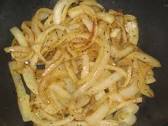
Onions, Garlic, Chives
Like onions, leeks, and chives, garlic is part of the Allium family, and it is five times more toxic to dogs than the rest of the Allium plants. Onions and garlic in all forms — powdered, raw, cooked, or dehydrated — can destroy a dog’s red blood cells, leading to anemia. That can happen even with the onion powder found in some baby food or spaghetti sauce. A tiny dose is probably OK. But eating a large quantity just once or eating even smaller amounts regularly can cause poisoning. Symptoms of anemia include weakness, vomiting, little interest in food, dullness, breathlessness, pale gums, elevated heart rate, and collapsing. Poisoning from garlic and onions may have delayed symptoms, so if you think your dog may have eaten some, monitor him or her for a few days, not just right after consumption.
These vegetables and herbs can cause gastrointestinal irritation and could lead to red blood cell damage. Although cats are more susceptible, dogs are also at risk if a large enough amount is consumed. Toxicity is normally diagnosed through history, clinical signs and microscopic confirmation of Heinz bodies.
Read about our Onion Scare with Kilo when he stole an onion quiche. The ASPCA Pet Poison Hotline was fantastic as they have all the stats to calculate the risk based on how much he ate, his weight, his age etc and he was fine.
Cherries, Persimmons, Peaches, and Plums Seeds or Pits
The problem with these fruits is the seeds or pits and sometimes stems too. The seeds from persimmons can cause inflammation of the small intestine in dogs. They can also cause intestinal obstruction. Obstruction is also a possibility if a dog eats the pit from a peach or plum. Plus, cherry, peach and plum pits contain cyanide, which is poisonous to both humans and dogs. The difference is humans know not to eat them. Dogs don’t.
Raw Eggs
I have friends who feed raw and have told me the benefits of raw eggs for dogs. However, there can be two possible problems with giving your dog raw eggs. The first is the possibility of food poisoning from bacteria like Salmonella or E. coli. The second is that an enzyme in raw eggs interferes with the absorption of a particular B vitamin. This can cause skin problems as well as problems with your dog’s coat if she’s been eating any substantial quantity of them for a long time.
Cooked eggs in moderation are OK and Kilo often gets a tiny bit of mine. I even did a Dog Licks version for us.
Raw Fish
Salmon, trout, shad, or sturgeon can contain a parasite that causes “fish disease” or “salmon poisoning disease.” If not treated, the disease can be fatal within 2 weeks. The first signs of illness are vomiting, fever, and big lymph nodes. Thoroughly cooking the fish will kill the parasite and protect your dog. Cooked fish like salmon can be an excellent source of protein, good fats and amino acids.
I had no idea about this one and have been sharing my favourite salmon sushi with Kilo. He LOVES salmon and tuna.
Salt and Salty Snack Foods
Large amounts of salt can produce excessive thirst and urination, or even sodium ion poisoning in pets. Signs that your pet may have eaten too many salty foods include vomiting, diarrhea, depression, tremors, elevated body temperature, seizures and even death. As such, we encourage you to avoid feeding salt-heavy snacks like potato chips, pretzels, and salted popcorn to your pets.
Yeast Dough
Before it’s baked, bread dough needs to rise. And, that’s exactly what it would do in your dog’s stomach if she ate it. As it swells inside, the dough can stretch a dog’s abdomen and cause severe pain. In addition, when the yeast ferments the dough to make it rise, it makes alcohol that can lead to alcohol poisoning.
Xylitol
Xylitol is used as a sweetener in many products, including gum, candy, baked goods and toothpaste. It can cause insulin release in most species, which can lead to liver failure. The increase in insulin leads to hypoglycemia (lowered sugar levels). Initial signs of toxicosis include vomiting, lethargy, and loss of coordination. Signs can progress to seizures. Elevated liver enzymes and liver failure may be seen within a few days.
Candy, gum, toothpaste, baked goods, and some diet foods and peanut butters may be sweetened with xylitol.
What Common Human Foods Are Safe For Dog?
Fruits
Apples, bananas, berries, melon, apple and watermelon. Be sure to remove seeds, stems, and leaves first, because they can cause serious problems.
Lean Meat
Be sure to remove all visible fat including the skin on poultry. Also be sure there are no cooked bones in the meat before you give it to your dog.
Peanut butter
Kilo and I share a teeny bit of natural unsalted peanut butter on toast every morning.
Vegetables
Kilo the Pug and I often share healthy snacks of raw carrot sticks, green beans, cucumber slices, cauliflower, broccoli, or zucchini slices. We also enjoy peas and plain baked sweet potato, pumpkin and potato . But don’t let your dog eat any raw potatoes or any potato plants it might have access to in your garden.
Read: Healthy Snacks To Fuel Your Dog
Try our Dog-friendly Holiday Recipes if you want to include your dog this Thanksgiving. Kilo loves Turkey Mutt Loaf.
Do You Share Human Food With Your Dog? Comment Below.

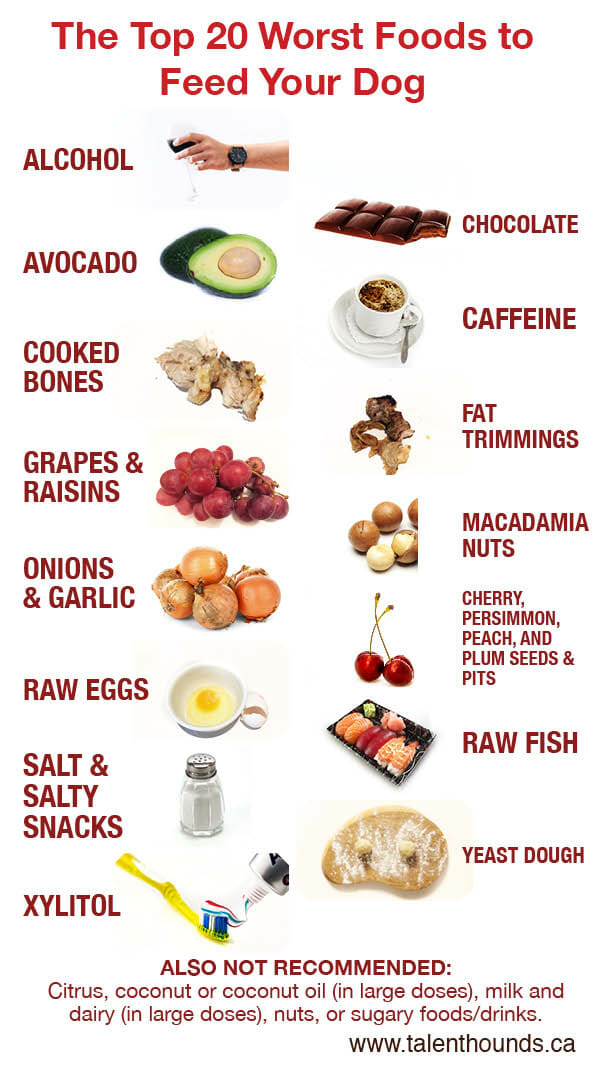
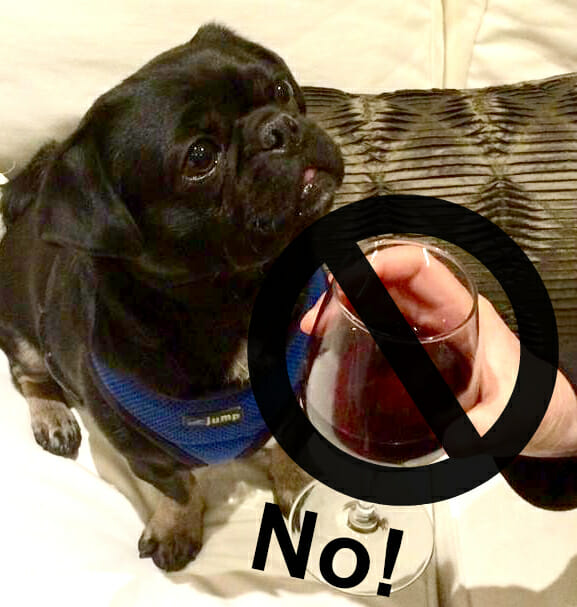
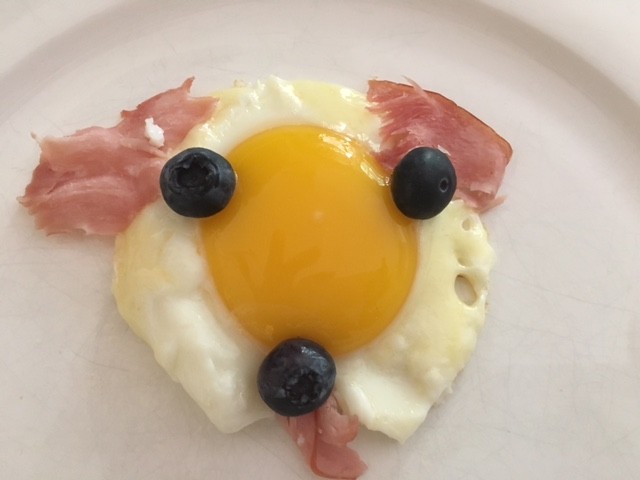
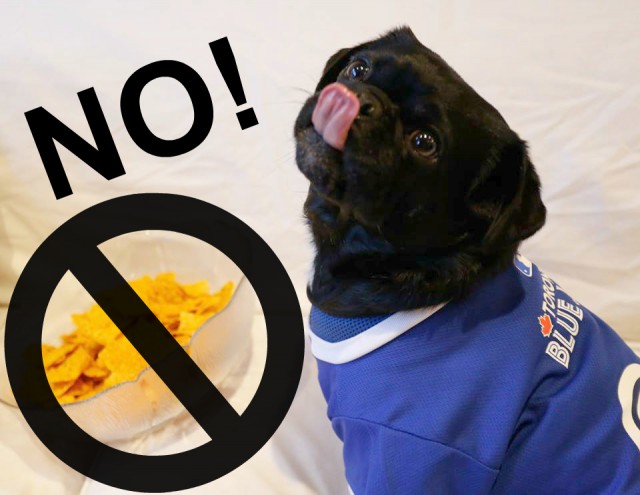
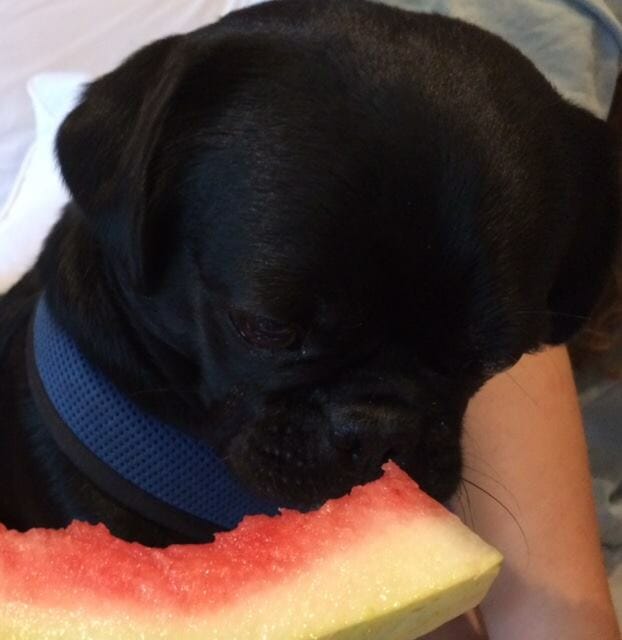
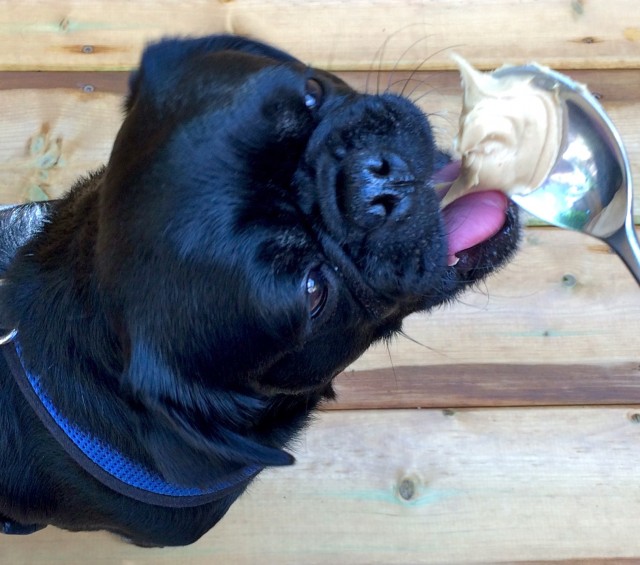
It’s important for everyone to check the label on their peanut butter to ensure the brand you use does not contain Xylitol! Additionally, we recently learned that the pits and stems of cherries also contain cyanide!
Wow thanks for that info. I had just heard that cherries are good for arthritis so good to know. The pits and stems of several other fruits can also be toxic so I’ll update.
Wow I had NO idea about cooked bones!! We have been bringing our Lyla bones home when we eat BBQ ribs for years but it totally makes sense! While she may not choke on them she sure could get something inside of her that could cause issues. Thank you for this.
Great list! The “baker’s chocolate” is the worst offender…milk chocolate doesn’t contain as much theobromine although it can cause diarrhea (and a mess!). Besides, I want the chocolate all for ME! LOL!
Thanks for sharing this list! It’s a reminder we can all use every once in a while, especially now that the holiday and party season is upon us. I’m happy Kilo recovered from eating things he shouldn’t have. The on thing that I absolutely refuse to allow in the house is anything that has Xylitol!!!
This is a great reminder and just in time for all those relatives who mean well… 😉
Great resource and I will definitely save this post. I just recently learned about macadamia nuts and nuts in general. I am a vegetarian and eat lots of nuts as a meat substitute. I am now extra careful not to drop any or leave them where Ruby might grab a few.
Yes they are so tempting as they look like kibble and smell salty. Kilo stole some olive pips last week and stashed them in his crate – still not sure where he found them but I think a guest must have left a pile on a table or they fell out of the bowl when I was cleaning up.
We are pretty strict about what snacks are dogs get. I think all of my kids know the safe foods because I’ve warned them so often about the toxic ones. I did stop buying gum because I just wasn’t sure I could keep it away from my dogs. I do check the peanut butter jar (I always buy the same kind) to make sure they haven’t changed the ingredients. I give Nelly her medicine with peanut butter.
Yes I stopped chewing gum but my daughter still buys it as helps her indigestion and we had a near disaster when Kilo got a tissue that she had used to dispose of a chewed bit. GRRR So scary.
Thank you for this list. I’ve share similar lists with my parents many times for their dog.
Great list, its so important to educate ourselves about the things that can potentially hurt our pups!
I love you also included a list of things that ARE safe to feed to our dogs.
Most of these food are problematic for cats too – great reminder with the holidays approaching.
Yup, Salmon poisoning disease is quite common in the Northwest. I know raw feeders will just freeze fish for a long time to kill off parasites but I’m paranoid so he really only gets cooked fish.
Great list! Yes, dogs don’t tolerate dairy very well. A good alternative is goat milk. Cute egg treat!
Excellent post! It’s always a very good idea to remind folks about the pet dangers lurking in our kitchens, especially during the holidays. With Xylitol, I also remind ladies and gents to watch their jacket pockets and purses where they may have a pack of sugarless gum or candy that a pet can get into. So close those purses and put them way up high! My Huskies do enjoy a few human treats under very close supervision (they love bites of pizza crust and some occasional licks of vanilla ice cream! They do get organic nonfat yogurt and a little coconut oil in their foods, and they love blueberries and bites of raw carrots!) We hope you all have a safe and very Happy Thanksgiving!
Great and helpful post. It’s an important reminder, particularly around the holiday season. We always find ourselves reminding family members who don’t have dogs of their own that certain foods are not safe, and they scoff like we’re concocting thoughts.
Thanks- yes. We had similar with an elderly family friend giving the dogs grapes. Resulted in emergency vet trip.
Great tips! Love the fact that you also shared what is safe for dogs to eat.
Thanks for this reminder although Layla does get a bit of garlic powder on her homemade jerky and the vet says its quite okay plus her dog food has it in also
Great list of dog UNfriendly things to let your dog eat. Kilo’s olive story is funny, but could have been a disaster! Thank DOG you found those pits. Just one reason I love your Dog Licks segment!
Love & biscuits,
Dogs Luv Us and We Luv Them
so glad you shared this post. we see a lot of toxicity cases at our hospital for items such as these. thanks so much for sharing this important info!